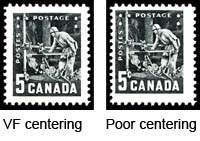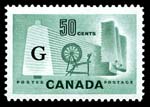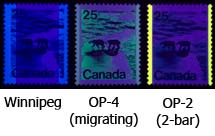
|
Elizabethan II Study Group Journal: The Corgi Times Glossary |
O | |||||||||||||||||||||||||||||
| OCR - acronym for Optical Character Reader equipment, capable of reading the postal code. Was first installed in Ottawa on January 4, 1972. The machines are located at large Letter Processing Plants (LPP) or Mail Processing Plants (MPP) in each province. Incoming letters were scanned and the postal code was read by a computer which converted it to a series of 6mm bars that were sprayed, in orange or pink, 10mm above the base of the envelope. See MLOCR. |
 OCR coding |
||||||||||||||||||||||||||||
| Obliteration - synonym for cancellation. A special postmark employed for defacing stamps. | |||||||||||||||||||||||||||||
| Off-centre - a stamp not centrally printed within the limits of the paper. That is, with margins of uneven width, as opposed to a 'well-centred' copy. Stamps off-centre are generally regarded as less valuable or desirable than those perfectly centred. |
 |
||||||||||||||||||||||||||||
| Officials - stamps issued for the use of Government departments, public servants, members of parliament or senate, etc. Such stamps may, or may not, be supplied free, but are a check upon usage and expenditure. During the Elizabethan period in Canada, regular issue definitives were overprinted 'G' to note Government usage. |
 G overprint |
||||||||||||||||||||||||||||
| Off paper - stamps soaked free from superfluous paper. | |||||||||||||||||||||||||||||
| Offset -
(1) a printing process that transfers an inked image from a plate to a roller. The roller then applies the ink to paper. (2) the transfer of part of a stamp design or an overprint from one sheet to the back of another, before the ink has dried (also called set off). Such impressions are in reverse. They are different than stamps printed on both sides. Varieties might be referred to as offset on gum side. |
 |
||||||||||||||||||||||||||||
| On cover - a stamp on the envelope or wrapper as received. | |||||||||||||||||||||||||||||
| On paper - stamps still adhering to parts of the covers on which they were used. | |||||||||||||||||||||||||||||
| On piece - a stamp on sufficient of the original envelope or wrapper to show complete postmark, or other philatelic evidence of importance to prove authenticity - as in a bisect, for instance. |
 On piece |
||||||||||||||||||||||||||||
| OP-4 and
OP-2 tagging - two major types of
General
tagging introduced in Ottawa, Ontario in 1972. See also Winnipeg tagging. |
 |
||||||||||||||||||||||||||||
| Order
number - appear in the left selvedge on only the
lower left corner of the
sheet of
stamps. That is, only lower left
plate blocks
will include the control number. The last Canadian stamps to have a control number left on an issued post office pane was the 5c Royal Visit commemorative issued October 10, 1957. |
 Order number |
||||||||||||||||||||||||||||
| Original gum - the adhesive coating on a mint or unused stamp or envelope flap applied by a postal authority or security printer, usually before the item was issued. | |||||||||||||||||||||||||||||
| Overprint - any printing on top of and in addition to the original design. Where the face value of a stamp is altered by an overprint, it is more correctly described as a surcharge.
See 'Vancouver overprint'. |
|||||||||||||||||||||||||||||
| Oxidation - darkening of the ink on certain stamps caused by contact with air or light. Some inks used in printing stamps, especially oranges, may in time turn brown or black. | |||||||||||||||||||||||||||||
|
© 2001-2017, 2018 Website design by: Adminware Corporation. For information or questions regarding this website, please contact Robin Harris |